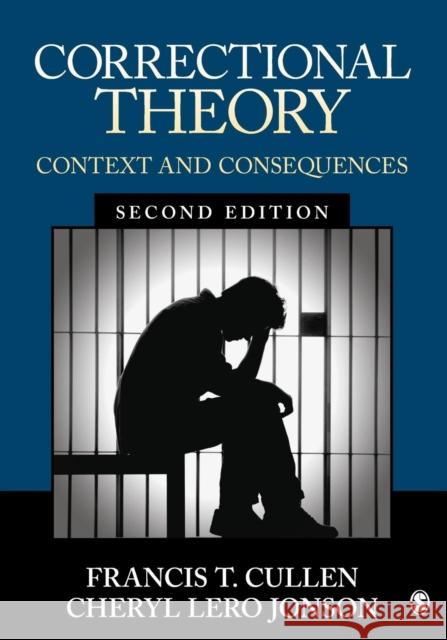Correctional Theory: Context and Consequences » książka



Correctional Theory: Context and Consequences
ISBN-13: 9781506306520 / Angielski / Miękka / 2016 / 352 str.
Correctional Theory: Context and Consequences
ISBN-13: 9781506306520 / Angielski / Miękka / 2016 / 352 str.
(netto: 391,82 VAT: 5%)
Najniższa cena z 30 dni: 382,84
ok. 22 dni roboczych.
Darmowa dostawa!
"The text is an incredible composite of the literature that has shaped correctional practice. The authors have a great capacity for making research interesting and accessible. Cullen and Jonson have accomp
"[The] writing style was clear and made the subject matter easily accessible to the students. Good, concise discussion of correctional theories including examples that enhanced the material being covered. The authors ask the readers to consider important questions that are not always considered in the public realm in thinking about whether certain correctional practices work or not. These questions helped promote engaging discussions in class."
Erin A. Orrick
Preface
PART I. Crisis in American Corrections
CHAPTER 1. From Theory to Policy: Evidence-Based Corrections
Theories of Corrections
Six Theories in Brief
Utility, Opinion, and Evidence
Evidence-Based Corrections
Conclusion: What's Ahead?
CHAPTER 2. Correctional Theory in Crisis: America's Changing Context
What Is Rehabilitation?
The Rise of the Rehabilitative Ideal
Attacking Rehabilitation
The "Nothing Works" Doctrine: Martinson and Beyond
Conclusion: Crisis in Correctional Theory
PART II. The Punishment Response
CHAPTER 3. Just Deserts: Doing Justice or Getting Tough?
The Concepts of Retribution and Just Deserts: Punishing the Crime
Retribution: Just and Painful
Four Problems for Retribution
The Justice Model: Restraining State Discretion
What Went Wrong? Winning the Battle but Losing the War
Conclusion: The Need for Crime Control
CHAPTER 4. Deterrence: Scaring Offenders Straight
The Concept of Deterrence
Is Deterrence a "Conservative" Theory?
The Theoretical Assumptions of Deterrence
Studying Whether Deterrence Works: Assessing Types of Evidence
Policy Changes That Increase Punishment
Macro-Level Studies of Punishment and Crime Rates
Perceptual Deterrence Studies
Deterrence in the Community
The Effects of Imprisonment
Conclusion: The Limits of Deterrence
CHAPTER 5. Incapacitation: Locking Up the Wicked
Too Many Prisoners
More Than Enough Criminals
The Concept of Incapacitation
Estimating the Incapacitation Effect: Studying Individual Offenders
Estimating the Incapacitation Effect: Macro-Level Studies
Conclusion: Compared to What?
PART III. The Social Welfare Response
CHAPTER 6. Restorative Justice: Reintegrative Shaming
The Concept of Restorative Justice
The Appeal of Restorative Justice
Three Problems
Does Restorative Justice Work?
Conclusion: The Limits of Harm
CHAPTER 7. Rehabilitation: What Works to Change Offenders
The Concept of Rehabilitation
Knowing What Works
Challenging Nothing Works: Narrative Reviews
Challenging Nothing Works: Meta-Analytic Reviews
What Does Not Work
What Does Work: Principles of Effective Intervention
What Else Might Work?
Conclusion: Reaffirming Rehabilitation
PART IV. Extending the Vision of Corrections
CHAPTER 8. Reentry: Saving Offenders from a Life in Crime
From Parole to Reentry
The Reentry Problem
Reentry Programs
The Effectiveness Problem
Two Things to Keep in Mind
Conclusion: Saving Offenders From a Life in Crime
CHAPTER 9. Early Intervention: Saving Children From a Life in Crime
Lessons From Childhood Criminology
The Need for Early Intervention
Five Programs That Work-At Least When Done Right
Two More Reasons to Support Early Intervention
Conclusion: Beyond Adult-Limited Corrections
CHAPTER 10. Six Correctional Lessons: Choosing Our Future
Three Themes
Four Lessons
Conclusion: Choosing Our Future
References
Index
About the Authors
Cullen, Francis T.
Francis T. Cullen is Distinguished Research Professor Emeritus and Senior Research Associate in the School of Criminal Justice at the University of Cincinnati, where he also holds a joint appointment in sociology. He received a Ph.D. (1979) in sociology and education from Columbia University. Professor Cullen has published over 300 works in the areas of criminological theory, corrections, white-collar crime, public opinion, and the measurement of sexual victimization. He is author of Rethinking Crime and Deviance Theory: The Emergence of a Structuring Tradition and is coauthor of Reaffirming Rehabilitation , Corporate Crime Under Attack: The Ford Pinto Case and Beyond , Criminology, Combating Corporate Crime: Local Prosecutors at Work , Unsafe in the Ivory Tower: The Sexual Victimization of College Women , Correctional Theory: Context and Consequences . Environmental Corrections: A New Paradigm for Supervising Offenders in the Community , and Communities and Crime: An Enduring American Challenge . He also is coeditor of Criminological Theory: Past to Present-Essential Readings , Taking Stock: The Status of Criminological Theory , The Origins of American Criminology , the Encyclopedia of Criminological Theory , The Oxford Handbook of Criminological Theory , The Oxford Handbook of White-Collar Crime , The American Prison: Imagining a Different Future , Challenging Criminological Theory: The Legacy of Ruth Rosner Kornhauser , Sisters in Crime Revisited: Bringing Gender Into Criminology , Delinquency and Drift Revisited: The Criminology of David Matza and Beyond , Deterrence, Choice, and Crime: Contemporary Perspectives . Professor Cullen is a Past President of the American Society of Criminology and of the Academy of Criminal Justice Sciences. In 2010, he received the ASC Edwin H. Sutherland Award. In 2013, he was honored by his alma mater, Bridgewater State University, with a Doctorate in Public Service .
Jonson, Cheryl Lero
Cheryl Lero Jonson is Assistant Professor in the Department of Criminal Justice at Xavier University. She received a Ph.D. (2010) in criminal justice from the University of Cincinnati. She is coeditor of The Origins of American Criminology , Sisters in Crime Revisited: Bringing Gender into Criminology , The American Prison: Imagining a Different Future , and Det errence, Choice, and Crime: Contemporary Perspectives . Her published work has appeared in Criminology and Public Policy , Crime and Justice: A Review of Research , and Victims and Offenders. Her current research interests include correctional policy, the impact of incarceration on recidivism, the use of incentives to downsize American prisons, inmate adjustment to conditions of confinement, strategies to prevent school shootings, and work reactions among criminal justice employees. From 2012 to 2015, she served as an Executive Counselor of the Corrections Section of the Academy of Criminal Justice Sciences.
1997-2026 DolnySlask.com Agencja Internetowa
KrainaKsiazek.PL - Księgarnia Internetowa









